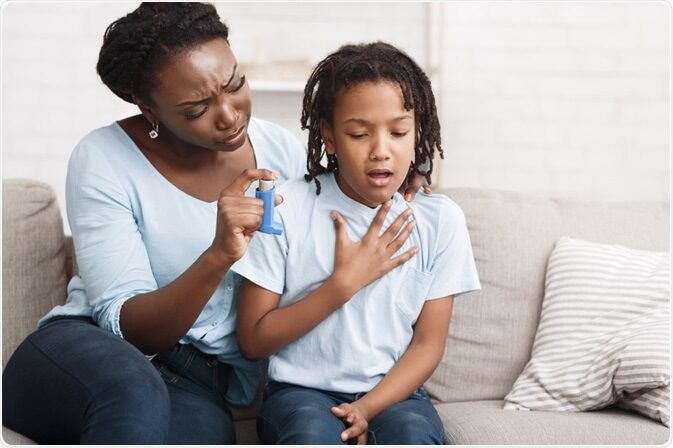A new study has revealed the hidden burden of asthma among schoolchildren in Ghana and other African nations, shedding light on the need for improved access to asthma diagnosis and treatment, particularly in rapidly urbanising areas.
The research, conducted by Queen Mary University of London, highlights how urbanisation and population growth have contributed to the rise of asthma in Ghanaian youth, with many children suffering from undiagnosed and untreated symptoms.
Asthma is the second leading cause of chronic respiratory deaths in sub-Saharan Africa, and Ghana is no exception.
The study, published in The Lancet Child and Adolescent Health, is the first to delve into the true prevalence of asthma among young people in Ghana’s urban areas.

Researchers recruited 20,000 students aged 12 to 14 from schools in cities across sub-Saharan Africa, including Accra and Kumasi in Ghana.
They found that 12% of students reported asthma symptoms, but alarmingly, only 20% of those had been formally diagnosed.
Asthma Symptoms Going Untreated
The study’s findings are especially troubling for Ghana, where rapid urbanisation has led to worsening air quality and higher exposure to pollutants.
Many students who reported symptoms were not receiving treatment, with nearly half of the undiagnosed participants showing strong indications of clinical asthma during lung function tests.
This gap in diagnosis means many Ghanaian children are left untreated, potentially worsening their condition.
Severe asthma symptoms were reported by two-thirds of the adolescents surveyed, and of those, 80% had never been diagnosed.
Even among those with a diagnosis, more than 30% of students with severe symptoms were not using asthma medications.
Challenges in Accessing Care in Ghana
Another alarming finding from the study was the lack of access to emergency medical care.
In Ghana, as in the rest of the study’s focus areas, nearly 45% of students with asthma symptoms had required emergency treatment within the past year, but many had not received the care they needed.
This highlights the critical need for better healthcare infrastructure, particularly in schools, where early diagnosis and intervention can help manage asthma.
Professor Jonathan Grigg, one of the study’s authors, emphasised the importance of addressing this issue: “Inhaled medications can control asthma in most children, but in Ghana and other parts of sub-Saharan Africa, many children are undiagnosed and untreated.
"This unmet need has gone unrecognized for far too long.”
A Call for Action in Ghana

Health professionals and policymakers in Ghana are being urged to take action.
Dr Rebecca Nantanda, a co-author of the study, stressed the need for urgent attention to the issue: “Undiagnosed and poorly controlled asthma severely affects the well-being of children and their families.
"The high burden of severe undiagnosed asthma requires immediate intervention, including better access to medicines and diagnostics.”
The study calls for a multifaceted approach to address the problem, including educational programmes to raise awareness of asthma in schools, screening initiatives to identify undiagnosed cases, and improved access to affordable medications.
In Ghana, where asthma often goes unnoticed or untreated, these interventions could dramatically improve the quality of life for many children.
Dr. Gioia Mosler, another researcher involved in the study, noted the scale of the issue: “If these findings are representative, there could be millions of adolescents with undiagnosed asthma across sub-Saharan Africa, including Ghana.
"Improved diagnosis and treatment strategies in schools are crucial to addressing the problem.”
This study serves as a wake-up call for Ghana’s healthcare system to prioritize asthma care and diagnosis, ensuring that the country’s young population is not left to suffer in silence.
As urbanisation continues, the need for improved healthcare infrastructure becomes even more urgent.
The findings provide a roadmap for stakeholders in Ghana to tackle the asthma burden head-on, making asthma care accessible and effective for all.
Latest Stories
-
500 small businesses to benefit from Republic Bank’s Caribbean Export programme
38 minutes -
5 dead as Islamic protesters clash with Nigerian military, police
39 minutes -
Black Kulcha Music releases ‘Love & Reasons Riddim’ album
55 minutes -
Thank you for the kind well wishes – Vice President on ill health
56 minutes -
McDan begins search for partners to establish industrial salt hub
1 hour -
T-bills auction: Government misses target for second time; interest rates fall marginally
1 hour -
President Mahama headlines AETC 2025 in Accra
2 hours -
Delivery of quality education: rehabilitation of classroom blocks enhances learning environment in North Tongu
3 hours -
Let Ghanaians know what happened to the Vice President on Friday – NPP
3 hours -
Tarkwa TNA Stadium to host MTN FA Cup semis
3 hours -
‘The aim of every coach is to win trophies’ – Prosper Ogum
4 hours -
Gold discovered in seven districts of Upper East Region – Minister
4 hours -
Ahafo Regional Minister raises alarm over rising drug abuse among youth
4 hours -
Tomato paste research: Who will give the consumer some clarity?
5 hours -
Fidelity Bank launches initiative to empower journalists in financial reporting
5 hours
